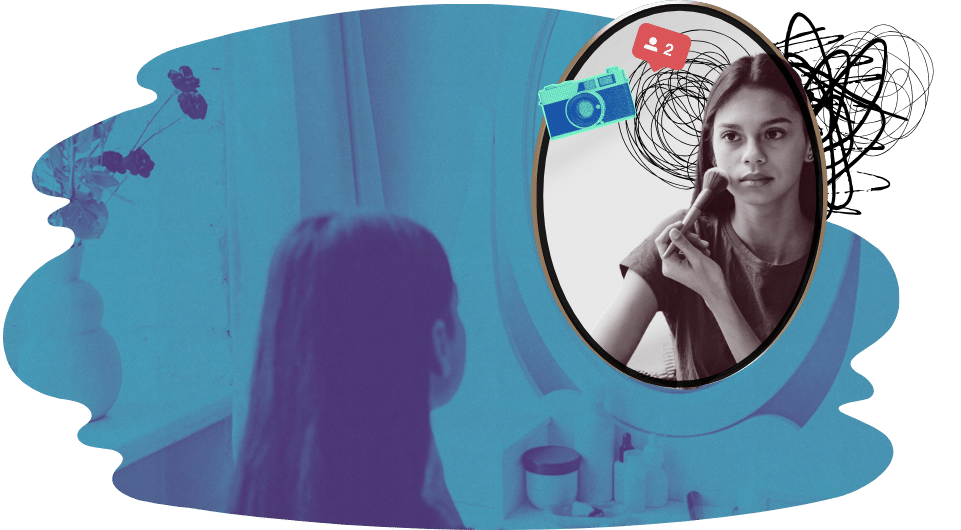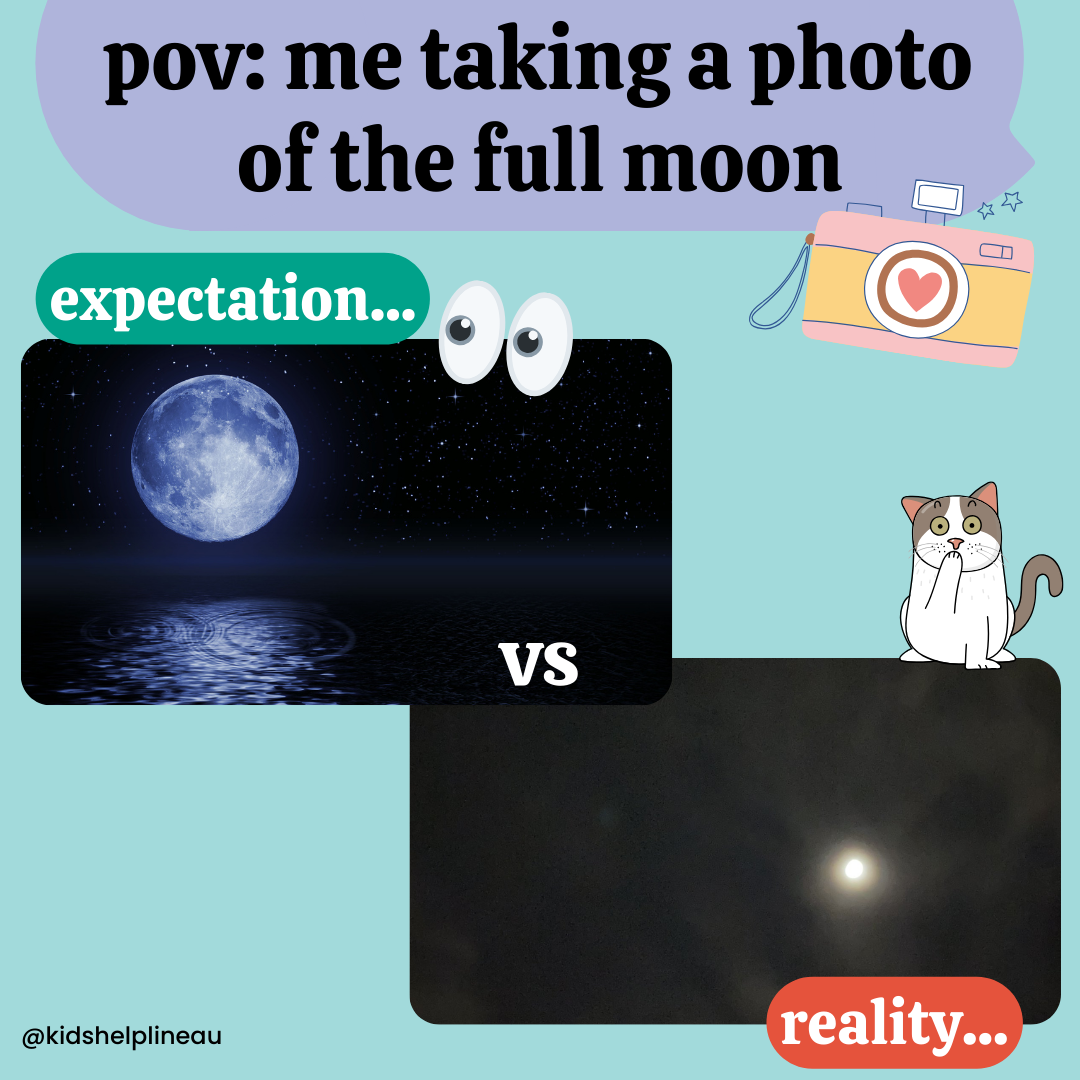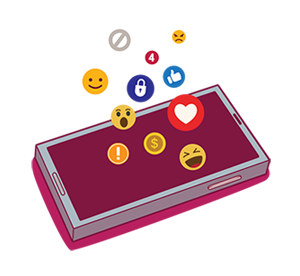Social media and mental health
Social media gets a pretty bad rap. It's true that it can ...
READ MEEver read a body positive quote on loving yourself and thought, 'Lmao love myself? I don’t even like myself! I HATE how I look!'? If this applies to you, you’ve come to the right place! By the end of this article, you probably won’t love yourself, but we bet you’ll find out some stuff you didn’t already know about body image - and hopefully, feel a little bit better about how you look.

Do you ever...
If you answered yes to any of these, chances are you might need to work a bit on your body confidence (tbh, most of us do!) Infact, 91% of you told us you worry about your body image. Let’s take a closer look at what it’s all about.
Body image is the way we see, think, feel and behave towards our bodies.
These are all connected. The way we see (or perceive) our bodies directly influences the way that we think and feel about our bodies – as well as shaping the way that we behave. Let’s take a closer look at what these mean.
The way you see your body – you aren’t overly negative or judge yourself too harshly.
The way you feel about your body. Good body image means you feel ok about your body generally – and might mean you sometimes feel confident, and sometimes you don’t (It doesn’t mean you feel great about yourself all the time – that's an impossible standard to meet!)
The way you think about your body. Good body image is about being fair to yourself – most of the time, you don’t make unfair comparisons, or obsess about flaws.
The way you behave depending on how you feel about your body. You don’t engage in harmful eating or exercise behaviours and your body image doesn’t stop you doing things you enjoy.
The way we see our bodies starts to take shape in early childhood and continues over the course of our life. Your relationship with your body is one of the most important, long-term relationships you will ever have!
Well... it’s complicated. It may not mean that you ACTUALLY hate your body,
it could just be that there is a complex history that has contributed to the way that you see your body. The TL;DR version: yep, society and the media have a lot to do with it.
What’s considered ‘beautiful’ varies across time and place. For example, a few hundred years ago in Europe having a tan was a big fashion no-no.
In the 1990s, fast fashion became big business. Runway shows with catwalk models were the way designers showed off and advertised their clothes. There used to be more diversity in the sizes and shapes of models - but designers found it hard to alter clothes to fit different models. Over time, they made models fit the clothes instead and had strict height and body weight requirements models needed to meet. Models kept getting thinner and thinner – and ‘thin was in’ in the 1990s (and still influences us today).
Stuff keeps changing - things like beauty products, makeup, social media, filters and cosmetic surgery (including injectables) are constantly changing what’s considered attractive – and affecting how people see themselves.

Actually, you don’t have to ‘love yourself’ - or look a certain way - to have good body image!
Even if you don’t love yourself, you can still:
Having a healthy body image doesn’t mean you have to be feeling yourself every day. It’s ok to have days where you aren’t feeling so confident about yourself. This happens to us all!
Don’t engage in body shaming yourself or others! Use empowering language to lift yourself and others up.
Try not to compare your body to other bodies. Unfollowing influencers on social media who promote a certain body shape can help with this, even if it’s just temporary.
Focus on who you are – sometimes we put too much focus on how we look.
Know that you don’t have to be positive or even love your body – treat yourself with respect, it’s ok to not like everything about how you look or feel ‘neutral’ about your body.
Have fun with your look and focus on expressing who you are. Be creative and wear stuff that has a positive impact on your wellbeing.
Think critically about people and products designed to ‘sell you’ something (especially when they do it by making you feel ‘not good enough’). Remember that images you see are often heavily photoshopped.
Celebrate diversity – follow and support people who are doing new, different and exciting things.
If you’re struggling with your body image, chat with a professional/get some support.
"We're here to share with you some ideas on how you can push back on some of these beauty ideals."
We've partnered with PROJECT ROCKIT to help you know what to say or do when you start comparing yourself to others on Insta.
You might have heard of the body positivity movement through influencers. The body positivity movement is about celebrating all shapes, sizes and abilities of bodies. Sounds like a good thing, right?
Some people feel that despite its good intentions, there are some drawbacks. The body positivity movement can focus too much on appearance, lack diversity and may support some unhealthy lifestyle choices.
There is also a practice called ‘body neutrality’. This is where you remain neutral towards your body – you don’t engage in either hating or loving your physical features, you just accept your body for what it is. The main difference between body positivity and body neutrality (as their names suggest) is that body positivity pushes for taking on a positive mindset towards body image, whereas body neutrality encourages the approach of remaining neutral – taking up space somewhere between self-love and self-hatred.
Bottom line – celebrate your body however feels right to you, don’t get too caught up in what you see on social media and get involved in movement with the goal of enjoying it, not to look a certain way.
Listen judgement free. Say things like “that must be really hard... It sounds like you’re feeling <x>”.
Compliment them on things not related to their body. Say things like “you’re an amazing friend – remember that time when you did <x> for me? I felt so supported!”
Do things together – with a focus on self-care. Go for a walk, spend time outdoors or check out a new band. *If food or exercise is a trigger for your friend, avoid these activities*.
Avoid talking about your appearance or talking about other triggers, e.g. diet talk. Instead, say things that focus on what your body let’s you do. E.g. “I’m grateful for how good it feels when I stretch or have a hot shower”.
Encourage self-kindness – if they say harsh things about themselves, say something like “you would never talk to me the way you talk to yourself”.
If the issue seems more serious, like an eating disorder or Body Dysmorphic Disorder – express concerns without judgement. Say something like “I’m worried <you aren’t eating lunch/how much you’ve been exercising>. Can we chat about that?”
Social media and mental health
Social media gets a pretty bad rap. It's true that it can ...
READ MEEating disorders
Eating disorders are serious and have a big impact on someone’s ...
READ METypes of eating disorders explained
Eating disorders can come in many forms. Here are the most common ...
READ MECoping strategies: As told by you!
We hand the mic over to you to share the coping strategies ...
READ ME
Talking helps! We’re here for you.
No problem is too big or too small.
We're here 24 hours a day, 7 days a week